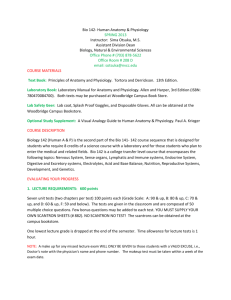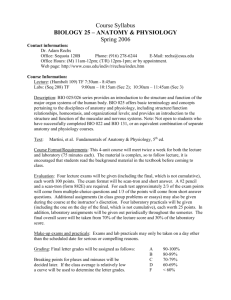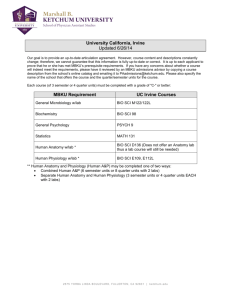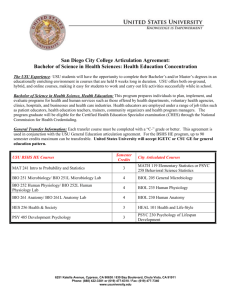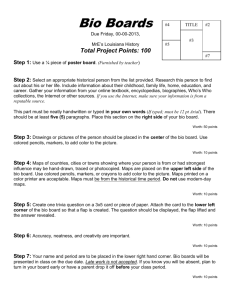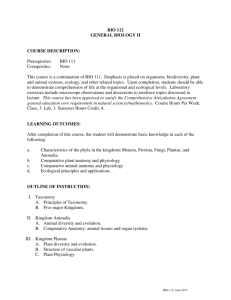Human Anatomy and Physiology I with Laboratory I BIO 141 Online
advertisement
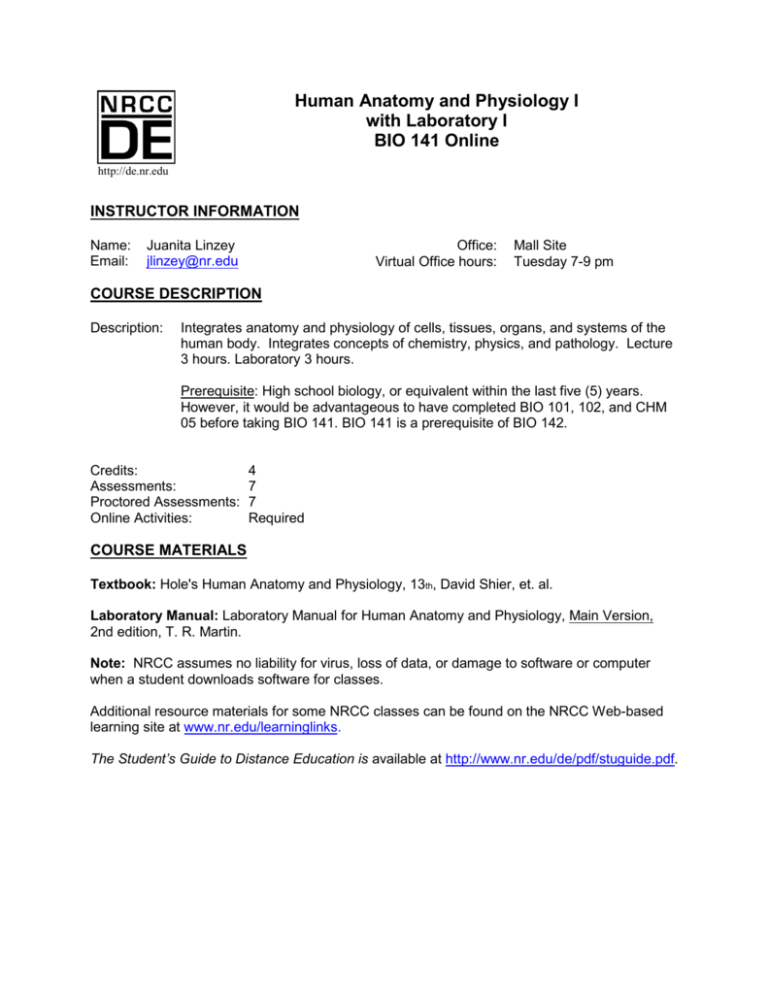
Human Anatomy and Physiology I with Laboratory I BIO 141 Online http://de.nr.edu INSTRUCTOR INFORMATION Name: Email: Juanita Linzey jlinzey@nr.edu Office: Virtual Office hours: Mall Site Tuesday 7-9 pm COURSE DESCRIPTION Description: Integrates anatomy and physiology of cells, tissues, organs, and systems of the human body. Integrates concepts of chemistry, physics, and pathology. Lecture 3 hours. Laboratory 3 hours. Prerequisite: High school biology, or equivalent within the last five (5) years. However, it would be advantageous to have completed BIO 101, 102, and CHM 05 before taking BIO 141. BIO 141 is a prerequisite of BIO 142. Credits: Assessments: Proctored Assessments: Online Activities: 4 7 7 Required COURSE MATERIALS Textbook: Hole's Human Anatomy and Physiology, 13th, David Shier, et. al. Laboratory Manual: Laboratory Manual for Human Anatomy and Physiology, Main Version, 2nd edition, T. R. Martin. Note: NRCC assumes no liability for virus, loss of data, or damage to software or computer when a student downloads software for classes. Additional resource materials for some NRCC classes can be found on the NRCC Web-based learning site at www.nr.edu/learninglinks. The Student’s Guide to Distance Education is available at http://www.nr.edu/de/pdf/stuguide.pdf. BIO 141-35 I. COURSE INFORMATION Prepared By: Juanita Linzey A. Approved By: Carol Hurst INTRODUCTION This is a Distance Education course designed specifically for those students whose learning styles are best served by providing instructional opportunities beyond the traditional classroom setting. This four credit (3 hrs. lecture, 3 hrs. lab) course is the first semester of a two-semester sequence (BIO 141-142) that provides a comprehensive and systematic study of the anatomy and physiology of the human body. Within this course the anatomy/physiology of the human body is integrated with pertinent microbiology, pathology, and related physical and chemical principles. BIO 141 is a college transfer level course designed to meet the requirements of students pursuing degrees in medical or paramedical careers or in physical education. B. COURSE OBJECTIVES Upon the successful completion of this course, the student will be able to: 1. Know the organization of the human body and applicable anatomical terminology used to describe the relative position of the body's parts, body sections, and body regions. 2. Know the basic structure of matter and the chemical constituents of cells. 3. Know the chemical composition and life cycle of a cell and various processes of movement through cell membranes. 4. Understand the control of metabolic reactions, and the mechanism of nucleic acid and protein synthesis. 5. Know the function and physical characteristics of epithelial, connective, muscle and nerve tissues. 6. Know in detail the organization of the skeletal system and the major features of the individual bones; development, growth and function of bones; the types of joints; and the clinical terms related to the skeletal system. 7. Know the structure and function of skeletal, smooth and cardiac muscle; the names of the major muscles; and the clinical terms related to the muscular system. 8. Know the structure and function of the nervous system including the organization of the brain and nerve tissue; various types of neurons and nerves and their pathways; and the physiology of nerve impulses. 9. Know the structure, location and function of the somatic and special senses of smell, taste, hearing, equilibrium and sight. New River Community College (F12) Page 2 BIO 141-35 C. INSTRUCTIONAL PROCEDURES Weekly assignments are posted on the course website. They include links to outlines, handouts, interactive activities, and lab assignments. D. GRADING/EVALUATION 1. The final grade for the course will be determined as follows: Description Laboratory Practical Exams (1st=50 pts., 2nd=100pts.) Laboratory Comprehensive Final Lecture Tests (3 @ 150 pts.) Lecture Final Exam (1) Total Point Value: Point Value 150 150 450 250 1000 You will have 60 minutes to complete each unit test and two (2) hours to complete the final exam. Nursing Students: A grade of C or better in A/P is required for the nursing program. 2. Grading Scale: A B C D F E. 900 - 1000 pts. 800 - 899 pts. 700 - 799 pts. 600 - 699 pts. 0 - 599 pts. STUDENT RESPONSIBILITIES 1. Handouts: (Located under Assignments or Course Documents) It is your responsibility to access these, print them out and learn the material they contain. They are designed to bring to your attention important concepts, to summarize interrelated material, or to simplify complicated concepts. You will be tested on information included in these handouts. 2. Outlines: (Located under Assignments or Course Documents) Use the outlines to make sure you cover all the important topics in the chapter. These are a GUIDE to important topics. You must read the information in the textbook and learn the related details, which are not included in these outlines. At the end of each chapter, your textbook has a Chapter Summary, which you may find helpful. I will hold you responsible for topics that are in the outlines and not all those covered in the textbook. 3. Laboratory: ALL LAB SESSIONS ARE ABSOLUTELY REQUIRED. No eating, drinking, or smoking is permitted in the lab. Before coming to your night lab, you must read and fill in your lab manuals for the appropriate chapters. All lab exercises and reports are due at the beginning of the lab period. I will collect and check them New River Community College (F12) Page 3 BIO 141-35 4. 5. 6. 7. F. while you are taking your lab practical. If you forget your lab assignments, no credit will be given. For each lab exercise and report missing or late, one point will be deducted from your lab practical grade. If all are turned in on time, 5 extra credit points will added to your final lab grade. There are approximately 29 lab exercises and reports due for this course and they are a very significant learning tool. Often, I will have questions from your lab reports on a lecture or lab exam. Attendance: You are expected to keep up with the weekly assignments. This course is difficult because of the volume of material that must be learned. If you ever get behind, it is almost impossible to catch up. You are expected to check email and announcements regularly and you must log into the course at least once a week. Failure to do so may result in being dropped from the course. Remember: ALL LABORATORY SESSIONS ARE REQUIRED! Lecture Tests: Lecture tests must be taken on campus or through an approved proctor. Testing Center and Proctor information is located under Faculty & Course Information and at www.de.nr.edu. All you will need for the test is a #2 pencil. Thus, do not bring books, paper, cell phones, calculators, etc. with you. The test booklet and an appropriate Scantron will be given to you. Tape Recorders: Tape recorders are NOT permitted in lab sessions without special permission. If tape recorders are required because of special circumstances (broken arm, etc.), please discuss this with your instructor prior to the class meeting. Cell Phones: Cell phones MUST be turned off prior to the lab. Disrespect for the faculty and fellow students will not be tolerated. This includes extraneous talking, paper shuffling, etc., while the instructor is talking or fellow students asking questions. Children are not allowed in the lab. WITHDRAWAL POLICY Student Initiated Withdrawal Policy A student may drop or withdraw from a class without academic penalty during the first sixty percent (60%) of a session. For purposes of enrollment reporting, the following procedures apply: a. If a student withdraws from a class prior to the termination of the add/drop period for the session, the student will be removed from the class roll and no grade will be awarded. b. After the add/drop period, but prior to completion of sixty percent (60%) of a session, a student who withdraws or is withdrawn from a course will be assigned a grade of "W." A grade of “W” implies that the student was making satisfactory progress in the class at the time of withdrawal, that the withdrawal was officially made before the deadline published in the college calendar, or that the student was administratively transferred to a different program. c. After that time, if a student withdraws from a class, a grade of "F" will be assigned. Exceptions to this policy may be made under documented mitigating circumstances if the student was passing the course at the last date of attendance. A retroactive grade of “W” may be awarded only if the student would have been eligible under the previously stated policy to receive a “W” on the last date of class attendance. New River Community College (F12) Page 4 BIO 141-35 The last date of attendance for a distance education course will be the last date that work was submitted. Late withdrawal appeals will be revised and a decision made by the Coordinator of Student Services. Instructor Initiated Withdrawal Students who have not attended class or picked up/accessed distance learning materials by the last day to drop the class and receive a refund must be withdrawn by the instructor during the following week. No refund will be applicable. Students who fail to submit work by the deadlines will be withdrawn after they have missed two assignment deadlines. Students who are withdrawn in this manner after the withdrawal date set each semester receive a grade of “F” in the course. You will be withdrawn from this course if you have not submitted your Introductory Email by noon on the required date. Also, on the college’s last day to withdraw date, you will be withdrawn with a “W” if you have not have not taken the first lab practical and second lecture test. No-Show Policy A student must either attend face-to-face courses or demonstrate participation in distance learning courses by the last date to drop for a refund. A student who does not meet this deadline will be reported to the Admissions and Records Office and will be withdrawn as a no-show student. No refund will be applicable, and the student will not be allowed to attend/participate in the class or submit assignments. Failure to attend or participate in a course will adversely impact a student’s financial aid award. G. CHEATING/PLAGIARISM POLICY A grade of zero will be awarded to any writing assignments or tests that show cheating or plagiarism. To plagiarize is “To use and pass off as one’s own the ideas or writings of another.” (Definition adapted from the American Heritage Dictionary.) Remember that plagiarism includes lifting words or ideas from Internet sites, as well as copying from print sources. Students are expected to do their own work on all assignments and tests. Failure to meet this expectation will result in the student receiving an “F” for the course. This includes plagiarism. H. DIVERSITY STATEMENT The NRCC community values the pluralistic nature of our society. We recognize diversity including, but not limited to, race, ethnicity, religion, culture, social class, age, gender, sexual orientation and physical or mental capability. We respect the variety of ideas, experiences and practices that such diversity entails. It is our commitment to ensure equal opportunity and to sustain a climate of civility for all who work or study at NRCC or who otherwise participate in the life of the college. New River Community College (F12) Page 5 BIO 141-35 I. DISABILITY STATEMENT If you are a student with a documented disability who will require accommodations in this course, please register with the Center for Disabilities Services located in the Counseling Center in Rooker Hall for assistance in developing a plan to address your academic needs. I. New River Community College does not discriminate on the basis of race, color, national origin, sex, disability, or age in its programs and activities. The following person has been designated to handle inquiries regarding the non-discrimination policies: Dr. Mark C. Rowh, Vice President for Workforce Development and External Relations, 217 Edwards Hall, 540-674-3600, ext. 4241. New River Community College (F12) Page 6
